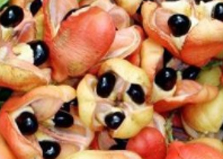
Source: Dig Jamaica-http://digjamaica.com/m/blog/ackee-good-bad/
Ackee is a fruit that is deeply embedded in Jamaica’s history and culture. Our national fruit can be both good and bad for you, depending on the circumstances.
The Good:
Firstly, the oil of the arilli of ackee are rich in many nutrients, including fatty acids such as oleic, palmitic and stearic acids, which are known to help reduce the risk of coronary heart disease when consumed in a balanced way. According to a study performed in the Biochemistry Department at UWI, Mona on the fatty acid composition of the arilli from ackee, 51-58% of the arillus dry weight consists of lipids. The major fatty acids observed were oleic, palmitic and stearic acids with linoleic accounting for over 50% of the total fatty acids, proving that the purified oil from ackee is highly nutritional and makes an important contribution to the fatty acid intake of many Jamaicans.
Other nutritional reports have suggested that ackee is rich in calcium, phosphorous, sodium, potassium, and vitamin C; it also contains zinc, and iron. The phosphorous, calcium and zinc aid in preventing bone demoralization and bone loss. Therefore, the consumption of ackee promotes healthy bones, to help reduce osteoporosis. The potassium in ackee acts as a Vasodilator (i.e. open (dilate) blood vessels) and that helps in the process of vasodilation (the dilatation of blood vessels). This reduces the risk of damage to the blood vessels, atherosclerosis and prevents the cardiovascular system from overexerting itself.
Another benefit of ackee to the cardiovascular system is that the iron contained in the fruit aids in the diffusion of oxygen from the blood to the cells that need it around the body. This iron may also help to reverse the symptoms of anemia which are weakness, cognitive issues and lightheadedness.
The fiber contained in ackee can aid in bowel elimination as it adds bulk to faeces. The fibre may also reduce cholesterol levels and aids in lowering the risks of inflammation, cramping, constipation and bloating of the colon.
Finally, ackee provides a boost to the immune system. It contains Vitamin C, which is known for its ability to aid in the body’s immunity and protect the body from various diseases.
The Bad:
It is important to note that ackee contains a poison known as hypoglycin, which is removed when it is harvested and cooked in the right way. In order to harvest the fruit properly, the fruit should not be removed from the tree until the pods open naturally. Additionally, the inside of the fruit must be properly cleaned of the red fibre inside. If the aforementioned precautions are not taken, consumers of the unripe fruit may suffer from ‘Jamaican vomiting sickness syndrome’, a disease caused by the hypoglycin poison. Symptoms of the disease include severe hypoglycemia and vomiting. Every individual should take great precaution when preparing the fruit for consumption. This will ensure that only the positive benefits are obtained from the fruit.

